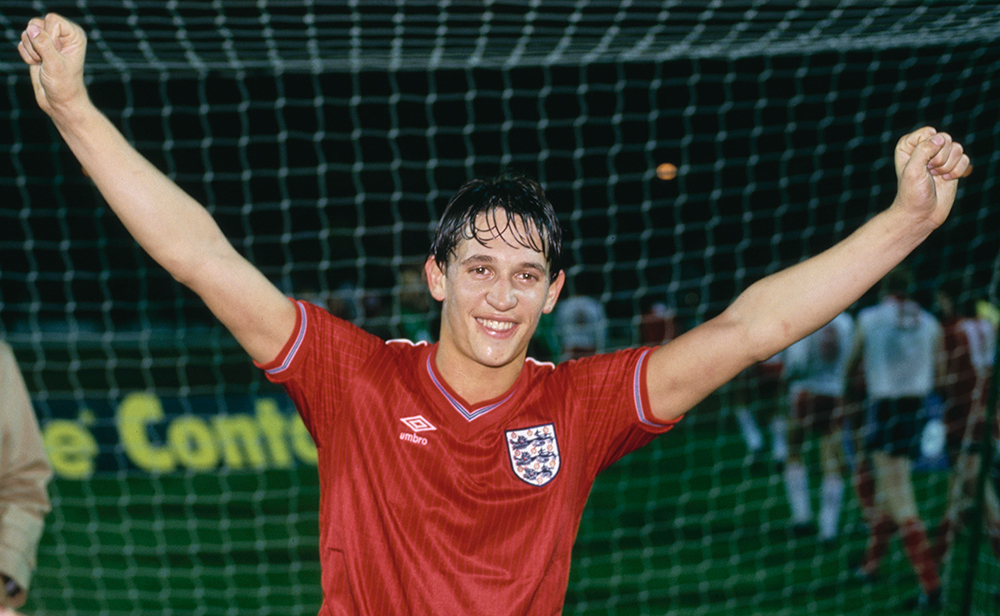
In his closing pages, Chris Evans delivers his verdict on his subject:
That’s what Gary Lineker is: human. As his story shows, it’s possible to accomplish seemingly impossible things while staying grounded and true to your roots.
I hate to be cruel about a diligently researched book by a freelance journalist. But unthinking writing cannot capture a man who managed to think himself into two great careers, first as a footballer and then as a TV presenter.
Lineker was born in Leicester in 1960. His parents were market traders who worked brutal hours, then relaxed over card games that could run all weekend, with participants (including the local crooner Engelbert Humperdinck) taking turns to retire for naps. As a teenager, he was possibly a better cricketer than footballer, as well as a mean snooker player and Leicestershire schools’ champion in the 400 metres. He was drawn to journalism from childhood. After watching Leicester City play he’d go home and write his own match reports.
He took a while to establish himself in City’s first team, and then rise to bigger clubs, because he was neither exceptionally skilful nor hardworking. One later teammate told Evans:
His normal week was, on Monday he had a bath, Tuesday he had a walk around, Wednesday he had off, Thursday he might train, Friday he had a bath, and Saturday he usually scored a hat-trick.
Lineker’s only assets were pace and intelligence. He worked out how to score goals.
Evans appears to have written this book without access to his subject. But Lineker is an approachable figure who has explained his methods to other writers. ‘I score goals by losing defenders, first and foremost by making dummy runs,’ he says in Pete Davies’s classic, All Played Out (1991). He might pop up unmarked in front of goal 20 times in a game, but only be passed to once. ‘Everybody says it’s being in the right place at the right time. But it’s more than that: it’s being in the right place all the time.’
His methods worked, slowly. He only made his full debut for England at the age of 24. Fifteen months later, he entered the 1986 World Cup still not a regular starter, and didn’t score in the first two games. A 28-minute hat-trick against Poland transformed his reputation. When England met Argentina, Diego Maradona delayed kick-off by trotting over to hug him. Afterwards, while Lineker’s teammates emoted about being cheated by Maradona’s Hand of God goal, the striker remarked simply: ‘I wish we’d scored it.’
Lineker always remained serene, in front of goal and beyond. Famously, he never received a yellow card, but, even more extraordinarily, he remains on good terms with both his ex-wives.
In 1986, at a time when most British footballers were terrified of ‘abroad’, Lineker joined Barcelona, learned Spanish and thrived. He returned to Tottenham, then made one final stop in Japan, for which he and his then wife spent six months studying Japanese (albeit almost fruitlessly). He said of his playing career: ‘It’s been far more than I could ever have expected.’ His teams won few trophies, but he always scored.
Evans seems to have aimed to produce a low-end, cliché-packed football biography of the kind that has almost died out, with match-by-match retellings of dead seasons. By contrast, the battle of Lineker’s baby son George with what was thought to be fatal leukemia is despatched in a few paragraphs. (Thankfully, George is now in his thirties.)

Only the final tenth of the book deals with the past three decades, during which Lineker remade himself as a TV presenter. After finishing playing, he never considered management: ‘I didn’t enjoy training, let alone standing there watching other people do it.’ Instead, he studied the craft of broadcasting as he had goal-scoring, then leveraged his charm, articulacy, wit and football status. He presented BBC’s Match of the Day, the world’s longest-running TV programme, for 25 years.
He also entered public life in a third incarnation: a liberal spokesman in the culture wars. During the Corbyn-Brexit era, the moral leaders of British liberals weren’t politicians but celebrities such as Hugh Grant, J.K. Rowling and Lineker. He took refugees into his home, and was suspended by the BBC after tweeting that the Tory government’s stance against migrants in small boats was an ‘immeasurably cruel policy, directed at the most vulnerable people in language that is not dissimilar to that used by Germany in the 1930s’. He stood accused of breaking the policy on impartiality; but he pointed out that, despite being the BBC’s best-paid presenter, he was officially a freelancer. Colleagues went on strike for him, while the Premier League’s players showed solidarity by refusing to give the BBC post-match interviews. The director general, Tim Davie, eventually climbed down.
Then last November news broke that the Match of the Day contract was not being renewed. Had Lineker’s opponents got him in the end? Evans delivers an incisive conclusion: ‘Whatever the truth was, one thing was for sure: it was the end of an era, both for Lineker and the BBC.’
Lineker deserves a serious biography.








Comments